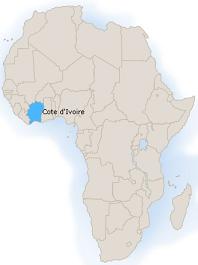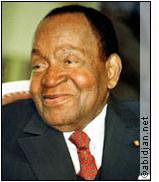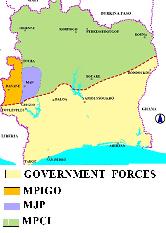[NOTE: This diary is part of the ongoing series Ten Stories the World Should Hear More About, a group project of the Booman Tribune.]
 Look at your young men fighting
Look at your young men fightingLook at your women crying
Look at your young men dying
The way they’ve always done before
Look at the hate we’re breeding
Look at the fear we’re feeding
Look at the lives we’re leading
The way we’ve always done before
I don’t need your civil war
It feeds the rich while it buries the poor
– Guns N Roses, Civil War
Some of these men he’s just met this night. Others have been his friends since ‘before’. Before they were soldiers. Before the fighting. Lord, how did we get here, he wonders? How have we come to this?
 Much of the Côte d’Ivoire’s past success can be directly attributed to the work of one man. Félix Houphouët-Boigny, known sometimes as the Sage of Africa, or the Grand Old Man of Africa. Though his title was that of President, he could more accurately be called a benevolent dictator. His term as President ran from 1960 until his death in 1993, but it wasn’t until his last re-election that he faced an opposition party as they had previously been illegal.
Much of the Côte d’Ivoire’s past success can be directly attributed to the work of one man. Félix Houphouët-Boigny, known sometimes as the Sage of Africa, or the Grand Old Man of Africa. Though his title was that of President, he could more accurately be called a benevolent dictator. His term as President ran from 1960 until his death in 1993, but it wasn’t until his last re-election that he faced an opposition party as they had previously been illegal.
Though the decline of Côte d’Ivoire’s economic prosperity began well before the end of the Houphouët-Boigny era, it wasn’t until after his death that the inner tensions in the country began to become evident. Côte d’Ivoire is made up of approximately 60 different ethnic groups, in large part due to a combination of an open border policy by Houphouët-Boigny and the country’s stability compared to its neighbors.
“I don’t know Adama. I think we must.”
Adama is one of the men that Salim has known for a very long time. Over the years they’ve become like brothers. They’ve been fighting rebels as members of a pro-government militia for nearly 4 years now.
Often they enjoy talking about life before the war, and trading amazed stories of the fights they’ve somehow survived.
 The new Ivoirian President, Henri Konan Bédié did not share his predecessor’s affinity to foreigners, nor his ability to keep social tensions suppressed. Under Bédié, immigrants were no longer given the same standing as Ivoirian nationals. Approximately 26% of the population (over half of them Burkinabés) were no longer considered true Ivoirians.
The new Ivoirian President, Henri Konan Bédié did not share his predecessor’s affinity to foreigners, nor his ability to keep social tensions suppressed. Under Bédié, immigrants were no longer given the same standing as Ivoirian nationals. Approximately 26% of the population (over half of them Burkinabés) were no longer considered true Ivoirians.
This new nationalistic ideal was used in order to fragment the political opposition, many of whom were immigrants. This led to political unrest, and Bédié was removed from office via a military coup in 1999. The following year, further unrest followed from an attempt to rig the Presidential election, resulting in many deaths and the installation of Laurent Gbagbo as the new President.
Following an unsuccessful coup attempt in 2001, in 2002 rebel forces took over the northern half of Côte d’Ivoire in a major coordinated attack against several major cities.
“Do you think there will ever be peace here again, Adama?
“Or have things already gone too far?”
“Nobody can fight forever, Salim. One way or another, there will be peace. Whether we will live to see it, or be free in it, I don’t know. But the fighting will stop eventually.”
“And that is why we’re here tonight, right?”
Eventually, the country finally arrived at a uneasy ceasefire. In 2004, the UN set up operations in Côte d’Ivoire to help maintain the ceasefire and work towards sustainable peace. A roadmap towards reuniting the country was drawn, and deadlines for progress were set.
At the expiration of Laurent Gbagbo’s term in 2005, new elections were scheduled to be held. However, Gbagbo declared that he would simply remain President, and postponed the elections indefinitely. The UN security council stepped in, and passed a resolution extending his mandate 12 months and scheduling the elections for October, 2006.
The driver steps out, a man Salim and Adama have known barely a week. He whispers to them:
“We’re here. Everybody out. Don’t leave any weapons in the truck.”
 This essentially brings us to where we are today. None of the sides in this struggle trust each other. In order to have elections, they have to first identify and register voters. In order to identify and register voters in the north, rebel forces must disarm. However, rebel forces will not disarm until a sizeable number of the pro-government militia groups first turn in their weapons.
This essentially brings us to where we are today. None of the sides in this struggle trust each other. In order to have elections, they have to first identify and register voters. In order to identify and register voters in the north, rebel forces must disarm. However, rebel forces will not disarm until a sizeable number of the pro-government militia groups first turn in their weapons.
With each time one side fails to meet a deadline, with each perceived or real violation of the shaky agreement, the entire process takes two steps backwards, and risk of all out civil war escalates.
One need look no further than the last couple weeks’ headlines to see just how narrow the line being walked.
- Security Council Condemns Recent Burst of Violence (Jul. 26)
- Local Government Officers Return to Rebel-Held North (Aug. 2)
- Dismantling of militias – UNOCI notices slow rate of weapon recovery (Aug. 3)
- Some 900 Militia Fighters Hand in Their Arms (Aug. 4)
- Disarmament suspended as militia fail to turn in arms (Aug. 4)
- Gbagbo Vows to Remain in Power Until the Next Elections (Aug. 7)
- Rebels in Cote d’Ivoire suspend dialogue with government (Aug. 9)
- UN Mission Calls On All Parties to Stay in Peace Process (Aug. 10)
Suddenly a door opens, and three men exit the building with their own guns trained on the small band.
“Put your weapons down immediately. What is your business here?”
“We are here to disarm” Salim says nervously. “We are tired of the fighting. We want peace, and to return to the lives we had.”
 Additional Information
Additional Information
- The UN ‘top 10’ story page for Côte d’Ivoire
- U.S. State Dept. Info Page
- U Penn African Studies page
- A Country Study : Ivory Coast from the Library of Congress

Salim and Adama are names and a story that I made up, but are based on this part of this article:
They are the first of an estimated 2,000 militia fighters to be disarmed by a 7 August deadline, part of a series of measures aimed at clearing the way for elections in October.
The fighters, who turned up in a pick-up truck, were met by officials from the disarmament, demobilisation and reinsertion (DDR) programme in the western town of Guiglo.
This was actually a really tough piece to write, because every day I’d read a new article in which it seemed that things were starting to lean the opposite way. I included the story of the militia fighters disarming to try to give it a little flavor of hope, but right now I fear that the situation is less stable than it was a mere 10 days ago.
– Liberia (olivia)
– Democratic Republic of the Congo (vieravisionary) Part I Part II
– Sanctuary (Nanette)
– Refugees (Kahli)
– South Asian Earthquake (Poeschek)
– Behind Bars, Beyond Justice (Man Eegee)
– The Water of Life (Captain Future)
thanks for your contribution to this group project. I have so much reading to do from everyone’s various links. I was aware of the country being in the headlines and read one or two recently, but you’ve provided a great resource here. The story was a nice touch, I like the way it brakes up the text and humanizes the impact of the strife going on there. Paz
Thanks ManEe. And thanks for putting the project together, it is a fantastic idea, and one that I hope we model others off of.
It was a lot of fun to learn some of the history of a country that I had previously only been marginally aware of; I could have pointed Côte d’Ivoire out to you on a globe, but that’s really about as far as my knowledge went.
E, what a great and well written article. I have to tell you I did not know one thing about this place or its government. Soooo very interesting.
I have to tell you all you all are doing a great job here and I am really learning. I want to thank ME for this and all that are doing their projects and doing them well. hugs…
Thanks Brenda 🙂
One of the main reasons that I chose to volunteer for this topic was exactly because I didn’t know anything about it either. I’ve begun to be really fascinated by Africa, in large part due to this diary by devilstower over at dKos, which really opened up my eyes to how little I knew.
Excellent work, ejmw. I love how you’ve juxtaposed the fictionalized personal stories with the factual parts of it. It helps to humanize those involved a bit.
There are so many interwoven issues, old and new, in many of these stories that it’s difficult to know where to begin to even understand them. You’ve done a great job of presenting a starting place for this one, though!
Thanks Nanette, glad you enjoyed it 🙂
Oh, and I’ve been meaning to drop this one from the Guns N Roses song so I’ll do it here. I’m sure it’s not an original quote, but I don’t know who to attribute it to so Axl and gang will have to do.
Ejmw – I am very late to your wonderful diary, but I wanted to let you know I really appreciate what you have done. Thank you for your contribution.
What caught me in your diary was the “benign dictator.” I have wondered if that would work as a way to organize people and get them on a “better” course of some kind. And it seems to have worked, but only for a short time. Then it gets corrupted. Sigh.
Thank you for your imaginings of those willing to give up their weapons, to begin trusting, in the hope of contributing toward peace because they know what peaceful living is like. That was beautiful.